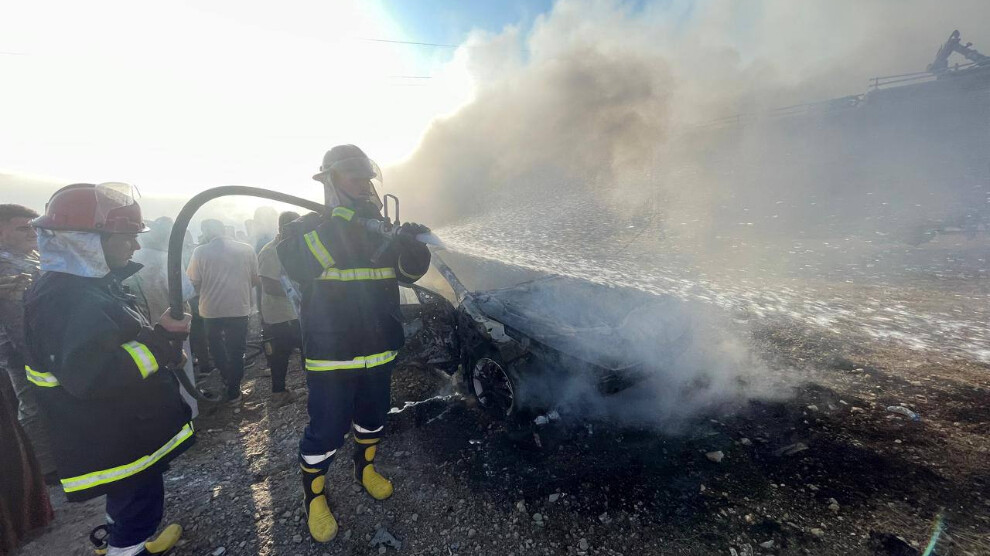Turkish UCAV strikes a car in Shengal
The Turkish state continues its genocidal attacks against the Kurdish people in various parts of their homeland, Kurdistan.
The Turkish state continues its genocidal attacks against the Kurdish people in various parts of their homeland, Kurdistan.

The occupying Turkish state carried out yet another attack in the Yazidi town of Shengal (Sinjar) in the Kurdistan Region of Iraq on Sunday.
According to reports from the ground, an unmanned aerial combat vehicle (UCAV) targeted a car in the foothills of Mount Shengal at around 14:50 local time.
Initial reports say that the attack claimed the life of a person who has not been identified yet.
Under the pretext of "fighting the PKK", Turkish warplanes and drones have repeatedly carried out airstrikes on Shengal since 2017. The specific targets are mostly institutions that were founded in the wake of the ISIS genocide - such as the administrative body "Shengal Democratic Autonomous Council" (MXDŞ) or the self-defence units YBŞ and YJŞ. The victims are mainly people from the civilian population - often survivors of the 2014 genocide.
In a wave of attacks by warplanes and UCAVs, the Turkish state bombed a total of 16 points in Shengal on 24-25 October, killing six fighters of the Shengal Resistance Units (YBŞ).
On 8 July, the vehicle of journalists who went to Til Qeseb town of Shengal to conduct interviews on the 10th anniversary of the 3 August 2014 genocide was attacked in the centre of Shengal on their way back. Çira TV reporter Medya Hasan Kemal, Çira FM reporter Murat Mirza Ibrahim and vehicle driver Xelef Xidir, along with 3 other people who were at the scene, were injured in the attack.
Another Turkish aerial attack on 8 March killed Mecdel Hesen Xelef, a commander of Shengal Resistance Units (YBŞ) and survivor of the ISIS genocide in 2014. The drone bombed a checkpoint near Til Êzêr where he was working. He was 32 years old and left behind a wife and son.
A few days earlier, civilian Sadun Mirza Ali had been killed by a Turkish drone in Shengal. The man was the father of three children and worked as a driver for the autonomous administration's committee for the martyrs. At the end of December, five workers from Rojava were killed in a drone attack in Shengal.
The Yazidi settlement area Shengal in the Kurdistan Region of Iraq is the last contiguous settlement area of the Yazidi community. Thousands of Yazidis were murdered and thousands of women and children were taken prisoner in the 3 August 2014 onslaught on Shengal by ISIS militants. While ISIS gangs began murdering Yazidis in Shengal, the Peshmerga left, leaving the Yazidis behind, unprotected. The guerrillas of HPG (People’s Defense Forces) and YJA Star (Free Women’s Troops) and fighters of the YPG (People’s Defense Units) and YPJ (Women’s Defense Units) came to the Yazidi people's aid in the face of ISIS aggression. Thanks to a months-long selfless struggle, the city was liberated on 13 November 2015. After the liberation of the city, the HPG and YPG/YPJ subsequently withdrew in 2017. People who returned to their land after Shengal's independence reformed, established defensive units and built their institutions.
The Turkish state, which has been frustrated by the liberation of Shengal and the military and political organization of the Yazidi community after ISIS' genocidal attack in 2014, has been attacking Shengal for seven years. Attacks by Turkey that violate international law have been routine in southern Kurdistan for years. The Turkish air force bombs the territory of the Kurdistan Region and Iraq on an almost daily basis, especially where guerrillas are suspected. However, civilian settlement areas are also regularly attacked by the Turkish army, including the Yazidi settlement area of Shengal and the Maxmur refugee camp. With its aerial terror, Ankara is pursuing a targeted policy of displacement - in particular by deliberately destroying civilian infrastructure.